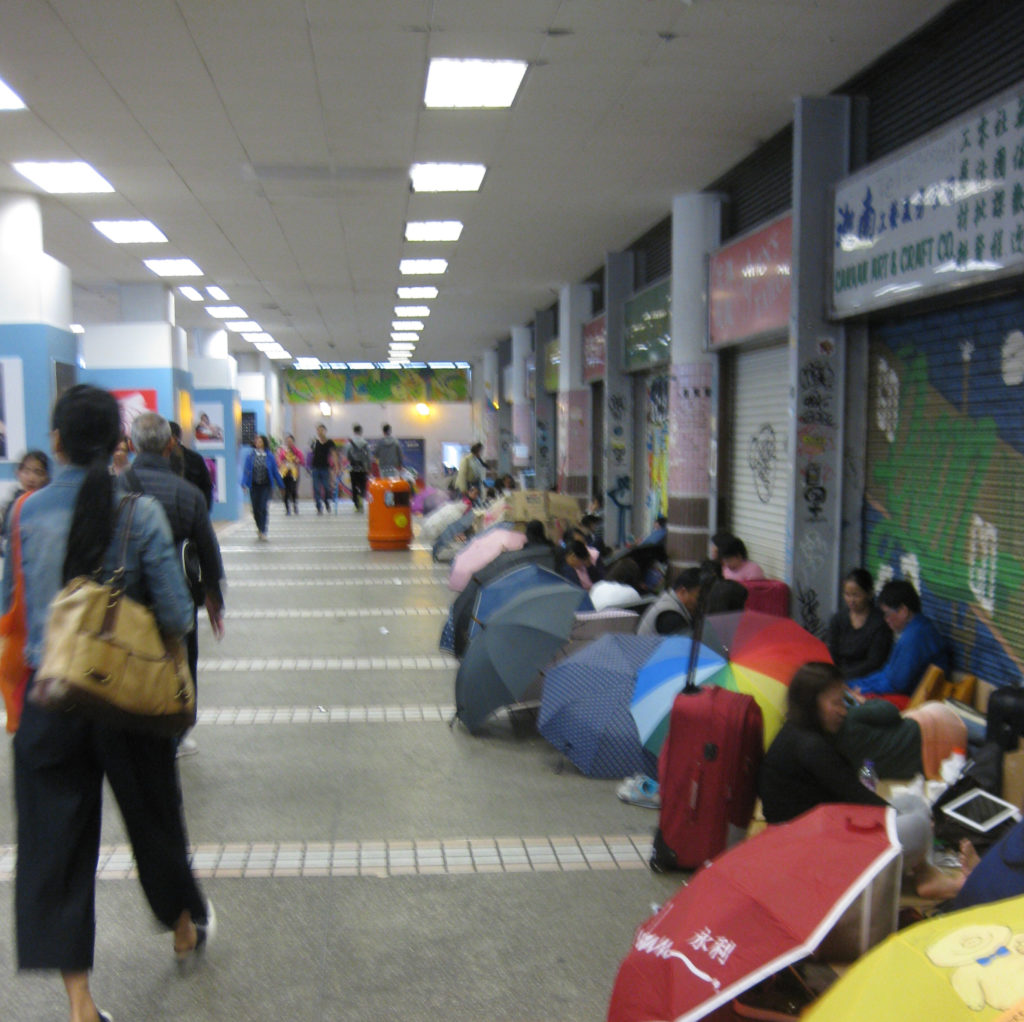Ghost: How I Learned About White Feminism
A few years ago I visited “Fragrant Harbor”: a place made of mountains, sea, and skyscrapers, with a dense population of people who look similar to me, but whose language I don’t understand. Like many places, Fragrant Harbor imports labor. Inside Fragrant Harbor’s tight arrangement of domiciles, imported female racialized labor is foundational to making homes and caring for people. Women from not-too-distant places leave behind their homes and families for long stretches of time, sometimes a lifetime. Through broad geographic generalizations, “The Women” might be seen as the same as Fragrant Harborers, but their language, food, customs, dress, and appearance are set apart by those who consider themselves “native” Fragrant Harborers. The Women work inconspicuously six days a week for other families. On the seventh day they are very very conspicuous.
After laboring for six days The Women are given a day off. On that day seemingly countless numbers of The Women can been seen congregating in public in spaces they have made with cardboard and tarp to accommodate their activities: lounging, sleeping, eating, worshiping, grooming, dancing, singing, writing, talking, planning, gambling, sharing, strategizing, and organizing. To begin to visualize what this gathering of women looks like: the population of Fragrant Harbor is roughly 7,390,090. Five percent of the population is migrant domestic workers, which translates to 369,504 women. Regulation stipulates that foreign domestic workers must live in their employers’ homes. Rather than remain in those homes on their day off, most favor the space of the city and each other’s company.
On the seventh day of the week, the city is transformed by The Women’s occupation of space with their bodies, belongings, energy, sounds and scents. This exceptional practice stays with me as a strategy for women to make their own spaces, an act of agency, and something that could be articulated in exhibition form.
With Lennypher’s love of travel, professional training, and her description of herself as “hella feminist,” I believe she will be interested in The Women’s practices and lives and be able to contribute to the project from the perspective of her field. She agrees to enter the competition together with the theme I propose, but she is quickly absent. I suppose she has gotten very busy planning and press on with the application working alone on our collective behalf. Success! We are awarded an exhibition.
Throughout the planning stages Lennypher continues to be ghostlike—white, illusive and intangible, making fleeting appearances.
In most cases, these ghosts do not know that they are dead or perhaps need your help. Talking to them to let them know they are dead may help them to move on to the next life. If you are brave enough, ask the spirit what he or she wants from you. You may be able to help.
-Paranomalistics, “How to Deal with a Problem Ghost”[1]
I let Lennypher know that for us to work together I need her to materialize. She tells me that in the world she comes from charts are how it’s done. She makes a chart that she says will help her stay the course. Her chart is blank. I remember to be brave and ask what she wants because I may be able to help. She needs me to fill out the chart and I do, laying out all the tasks ahead.
I think what happens in the nether world stays in the nether world as I can’t find any evidence that the activities listed in the chart are accomplished no matter what medium I use to try to communicate with Lennypher.
Now I know what a ghost is. Unfinished business, that’s what.
-Salman Rushdie, The Satanic Verses[2]
At this point it seems that she is my ghost. I might just have to live with her until the unfinished business is resolved. Lennypher has never been to Fragrant Harbor, seen or met any of The Women. I make the arrangements for us to go, to work towards resolving business.
Prior to going to Fragrant Harbor Lennypher proposes that we should do a workshop for The Women when we arrive. Puzzled, I ask a series of questions: What do you know about The Women? What do you think they need? What do you think you have to offer them? No answer from her. I don’t understand her ghost-speak. I find someone to interpret.
We, as white feminists, are really not so different from the missionaries of several generations ago. We want to travel to far-off, dreamily exoticized lands and bring the light of the truth to the people there. Like the missionaries, we assume that we will bring wonderful, life-changing revelations to these people….We think with delight of how appreciative these women will be, how they will fall about our feet with thanks for the truth that we’ve brought them.
We imagine how wonderful, how fulfilling it will be to know that we have saved these women.
-Anne Theriault, “The White Feminist Saviour Complex”[3]
Finally arriving at Fragrant Harbor, my third time there and Lennypher’s first, there is some adjusting to do. Lennypher points to many “weird” and “disgusting” signs of “uncleanliness” that she claims would never happen at home. I point out that travelers to The Chill might also find our ways odd. “Like what?! What do people find weird about The Chill?!” she demands angrily. I remind her that I can’t be sure since, although I look like people from Fragrant Harbor and that part of the world, I am from The Chill. I am merely explaining that things can seem unusual when you are a visitor anywhere. I am truly perplexed, since she had nothing but praise and a touch of envy for the cities in Europe and North America that we visited together.
This type of spirit exhibits a lesser degree of conscious awareness. They may appear, to those who witness them, as vague, uncertain, highly confused, or exhibiting deep sadness….They exist within a dreamy reality where nothing really changes for them. They often appear as white….They often do not respond when spoken to, however, they do have an awareness of sorts.
-ImagineSpirit.com, “Why Ghosts Stay Earthbound”[4]
As I am walking along the street with Lennypher she frequently, spontaneously, and loudly spits out, “Gross!” Startled, I ask her what she’s yelling about. “The food smells!” she replies. Fragrant Harbor seems to wholly offend her. Interestingly, Lennypher’s objections parallel the prejudice against The Women we are there to meet and learn from.
‘Filth’ and ‘stench’ are words usually associated with civic (un)cleanliness, but the perceived olfactory differences between social classes or ethnic communities produce, and are themselves produced by, classification systems which relate more to cultural ideologies than to odours or aromas themselves. Therefore, the ‘filthy stench’ of Central is not only disagreeable, it reaffirms unfavourable images of Filipino women as backward and unruly.
-Lisa Law, “Home Cooking: Filipino Women and Geographies of the Senses”[5]
Our weeks in Fragrant Harbor overlap with the Gift Giving Holiday. One morning we stop into a fast food chain restaurant so that Lennypher can purchase her morning coffee. The cashier smiles broadly at her and wishes her “Merry Gift Giving Holiday!” After walking away with her coffee Lennypher disdainfully asks why she was targeted with this greeting. Another time a drunk man on the street declares “Merry Gift Giving Holiday!” in our general direction. “Why the fuck does everyone keep saying this to me?!” Lennypher asks. Lennypher experiences this greeting as an act of “othering.”
Indeed, it is rare for most whites to experience a sense of not belonging, and such experiences are usually very temporary, easily avoidable situations. Racial belonging becomes deeply internalized and taken for granted. In dominant society, interruption of racial belonging is rare and thus destabilizing and frightening to whites.
-Robin DiAngelo, “White Fragility”[6]
“Whites are used to thinking of racism as an interpersonal thing, rather than institutional….[So] we think, ‘we’re the victims of racism now,’ paying no attention to the ongoing systemic imbalance in our favor.’ This is in part because the nature of privilege is that you don’t have to think deeply about your privilege if you don’t want to.
-Tim Wise, quoted in Touré, “White People Explain Why They Feel Oppressed”[7]
We are invited to share a holiday meal at a church where many women spend their seventh day together. We are greeted with warmth, hospitality, and copious amounts of food. The Women are curious about us and we exchange stories. Many of them are subjected to physical, psychological, and financial abuse by their employers. They are marginalized, devalued, and denied full participation in society. They are also activists and organizers and outspoken self-advocates. They are breadwinners supporting several generations and extended family back home. They are a society of women with internal groups organized according to friendships, geographical origins, activist goals, leisure pursuits, health care needs; there are also queer groups and a group of Indigenous women who take up rituals typically reserved for men in their culture.
After one of many long days meeting with women and advocacy organizations I look forward to relaxing with some television shows. We flip through the channels and arrive at a musical performance by a pop band. “See, I find Asian male popstars soooo feminine” Lennypher says.
When we talk about heteronormativity, we need to acknowledge the ways in which heteronormativity is racialized. That is, a key element of heteronormativity is meeting standards of whiteness….
In fact, imposing a Western European gender binary was (and is) a major part of forced assimilation (forcing native people to adopt the culture of the people colonizing their land). Male dominance (white male dominance in particular) was and is a major driving force in imperialism and colonialism.
-Kris Nelson, “What Is Heteronormativity – And How Does It Apply to Your Feminism? Here Are 4 Examples”[8]
And really, the reason why stereotypes about emasculated Asian men are harmful is because they make it easier to dehumanize them. If Asian men aren’t men, then they’re more like women—and Asian women are stereotyped as passive and weak.
In other words, if Asian men are more like women, they’re more vulnerable.
That’s why my real problem with stereotypes about Asian American men is that it further demonizes femininity. It makes femininity something to be exploited as well as something undesirable.
-Ashley Troung, “5 Reasons Why We Need to Change the Way We Talk About ‘Emasculating’ Asian Men”[9]
After several weeks, we return home to The Chill with our research. Our work is cut out for us as they say. The timeline is short and there is much to do. Once back, Lennypher settles back comfortably into our dynamic, me working at the tasks of the exhibition and trying to engage her participation, she fading in and out like an apparition.
I am exhausted by being the only one maintaining the project’s momentum, doing the emotional labor of maintaining a good working relationship despite Lennypher’s resolute absence and the emotional labor of trying to tolerate, manage, and educate her on her racist, classist, and heteronormative beliefs. I am sick and sleepless with the enormous weight of the project and Lennypher’s presumptuous entitlement haunting me night after night. I decide that there are some things I will need to leave to Lennypher in order to retain some of my health. Next, due to Lennypher’s inattention, to a task she agreed to, a crucial date is missed resulting in the loss of thousands of dollars from our project budget.
I make one last attempt to engage Lennypher’s full participation as a co-curator.
Automatic writing can be done either by hand or on a computer/device, and it offers a much less intimidating/scary option for communicating with ghosts. You must put yourself into an almost meditative state. Upon doing so, you’ll be able to start freely writing…
-Megan Grant, “10 Unexpected Ways to Communicate with Ghosts”[10]
This attempt to appeal to the apparition mostly fails. She does summon the words “team work”, which she describes as each of us making a personal financial contribution toward her error. She dodges responsibility like the type of abruptly swooping ghost seen in movies. The time comes for us to head back to Fragrant Harbor to mount the exhibition. Though she hasn’t admitted to ghosting, to Lennypher’s credit she does materialize in Fragrant Harbor, as fully as I have ever seen her. Though she struggles with this world, the project does reach completion.
We had planned to bring the exhibition to our home city eventually. The work that faces us ahead drives Lennypher into the realm of spirits once again. The unwelcomed, familiar feeling of being haunted returns to me in restless nights. My mounting disturbance gives me the resolve to be rid of this ghost. I am determined that I won’t subject myself to the terror of a ghost that seeks to instrumentalize the labor of racialized women as her vehicle. I let the ghost know that we both deserve peace and we should part ways. I wish Lennypher well and hope that she finds success and freedom on her own.
Have you known a person in your lifetime that was compulsively, neurotically, unsatisfiably needy? Have you known a person like that? Haven’t you had from that person the feeling that this hole is just too darn big to fill? You feel like you’re throwing it in and throwing it in and throwing it in and trying to love and trying to give them something, and they’re still whining. It never ends; and you spend the rest of your life doing this and nothing happens. The hole never fills up. Well, that is the kind of cause that results in a rebirth as a hungry ghost—a person whose habitual tendency is simply wrapped around self-absorption and what they need. I need, I need, I need. Can you gimme, gimme, gimme?
-Jetsunma, “The Hungry Ghost Realm”[11]
Lennypher raged at me as the hungriest angriest ghost demanding that I give her everything that had been generated by the exhibition in Fragrant Harbor and all the resources possible to re-make the exhibition, on her own in The Chill.
In Taoism, the hungry ghost is usually appeased by chants and food offerings in the hope that the spirit will have what it needs to move forward in the life-journey…Asian festivals that commemorate and honor hungry ghosts also feature food and drink offerings as well as pleasurable entertainment for the lost spirits.
-Angelsghosts.com, “Hungry Ghosts!”[12]
Lennypher appropriated what little she could with ghostly hands and disappeared with a howl.
Dear Lennypher: Those jointly generated project assets aren’t yours, but I am happy to discuss sharing them with you.
Dear racialized woman co-curator: Please do not contact me again. Future emails I receive from you will be blocked and not read.
(Or in other words Booo!)
[1] “How to Deal With a Problem Ghost,” Paranormalistics, accessed February 1, 2018, http://paranormalistics.blogspot.com/p/how-to-deal-with-problem-ghost.html
[2] Salman Rushdie, The Satanic Verses (London: Vintage, 1998), 554.
[3] Annie Theriault, “The White Feminist Savior Complex,” Huffpost, January 32, 2014, https://www.huffingtonpost.com/anne-theriault-/the-white-feminist-savior_b_4629470.html
[4] “Why Ghosts Stay Earthbound,” Imaginespirits.com, accessed February 1, 2018, https://imaginespirit.com/why-earthbound-spirits-stay/
[5] Lisa Law, “Home Cooking: Filipino Women and Geographies of the Senses in Hong Kong,” Ecumene 8, no. 3 (2001): 273, doi:10.1177/096746080100800302.
[6] Robin, DiAngelo, “White Fragility,” The International Journal of Critical Pedagogy 3, no. 3 (2011): 62, libjournal.uncg.edu/index.php/ijcp/article/view/249
[7] Touré, “White People Explain Why They Feel Oppressed,” Vice, September 17, 2015, 11:00 a.m., https://www.vice.com/en_us/article/qbxzpv/white-people-told-me-why-they-feel-they-oppressed-456
[8] Kris Nelson, “What Is Heteronormativity – And How Does It Apply to Your Feminism? Here Are 4 Examples,” everyday feminism, July 24, 2015, https://everydayfeminism.com/2015/07/what-is-heteronormativity/
[9] Ashley Troung, “5 Reasons Why We Need to Change the Way We Talk About ‘Emasculating’ Asian Men,” everyday feminism, October 20, 2015, https://everydayfeminism.com/2015/10/emasculation-asian-men/
[10] Megan Grant, “10 Unexpected Ways to Communicate with Ghosts,” Bustle, October 14, 2016, https://www.bustle.com/articles/185544-10-unexpected-ways-to-communicate-with-ghosts
[11] Jetsunma, “The Hungry Ghost Realm,” Tibetanbuddhistaltar.org (blog), April 4, 2017, http://www.tibetanbuddhistaltar.org/the-hungry-ghost-realm/
[12] “Hungry Ghosts!”, Angels & Ghosts (blog) accessed February 1, 2017, http://www.angelsghosts.com/hungry_ghosts





Dilettante Mail
Get updates from us a few times a year.